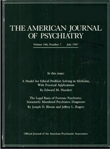Evidence of preference for a high-concentration sucrose solution in alcoholic men
Abstract
OBJECTIVE: The purpose of this study was to test in humans the finding from animal studies indicating an association between preference for more concentrated sweet solutions and excessive alcohol drinking. METHOD: The hedonic response to five different concentrations of sucrose solution was evaluated in 20 detoxified alcoholic and 37 nonalcoholic Caucasian men. All subjects repetitively tasted solutions with 0.05, 0.10, 0.21, 0.42, and 0.83 M sucrose concentrations and rated themselves on two scales measuring the intensity of sweetness and the likability of the solutions. RESULTS: A bimodal distribution of responses to the sweet solutions occurred in the nonalcoholic comparison group, with peaks at 0.05 M and 0.42 M. In the alcoholic group, 65% of the subjects preferred the highest sucrose concentration (0.83 M), compared with only 16% of the nonalcoholic group. CONCLUSIONS: The results of this exploratory study support the hypothesis suggesting a positive association between the preference for stronger sweet solutions and alcohol dependence.



